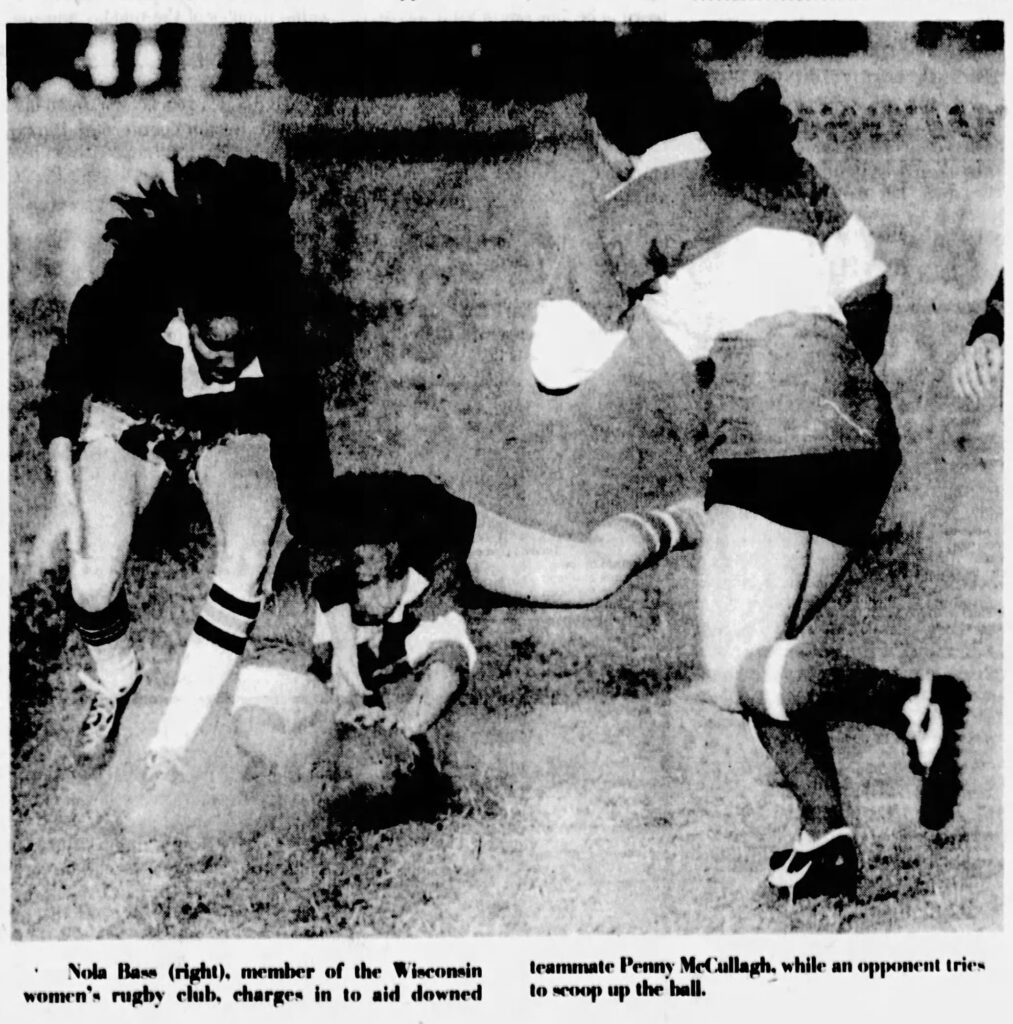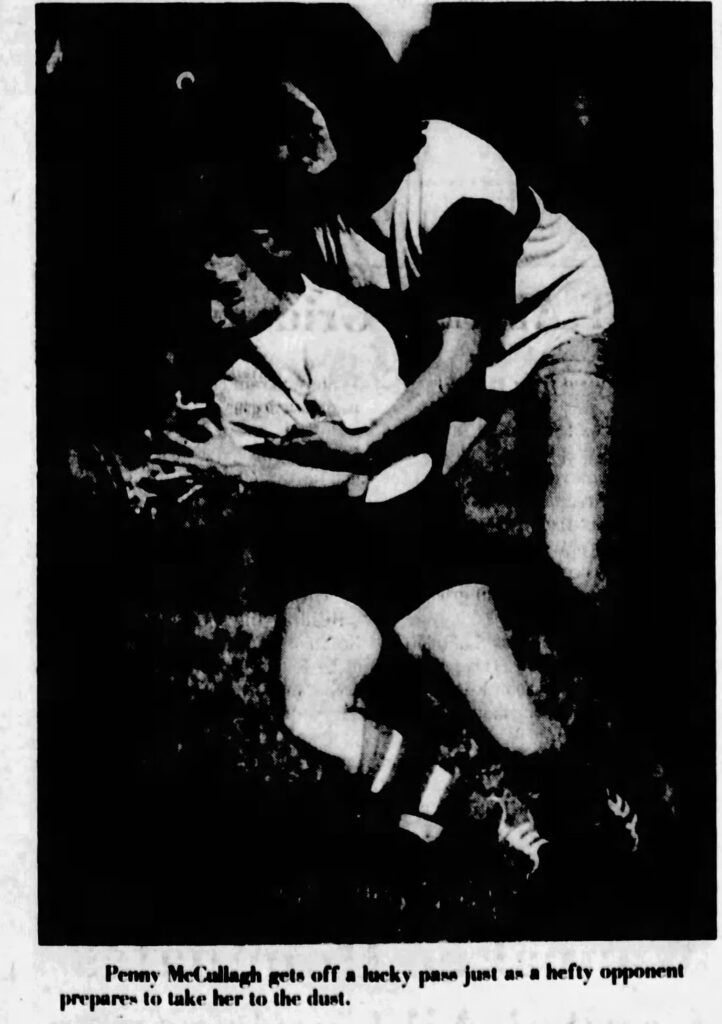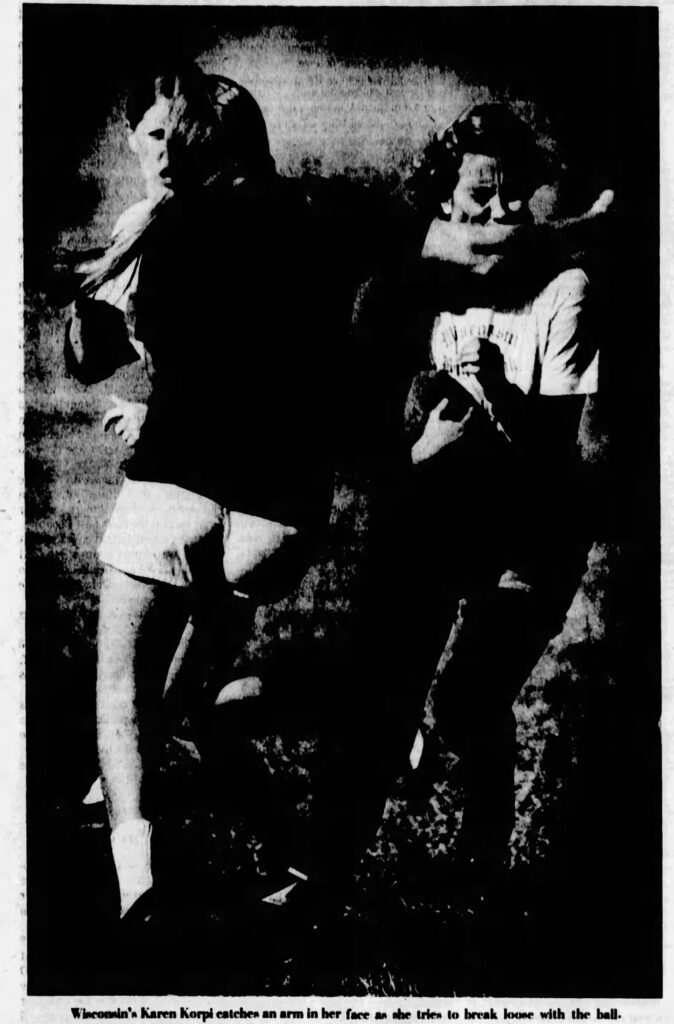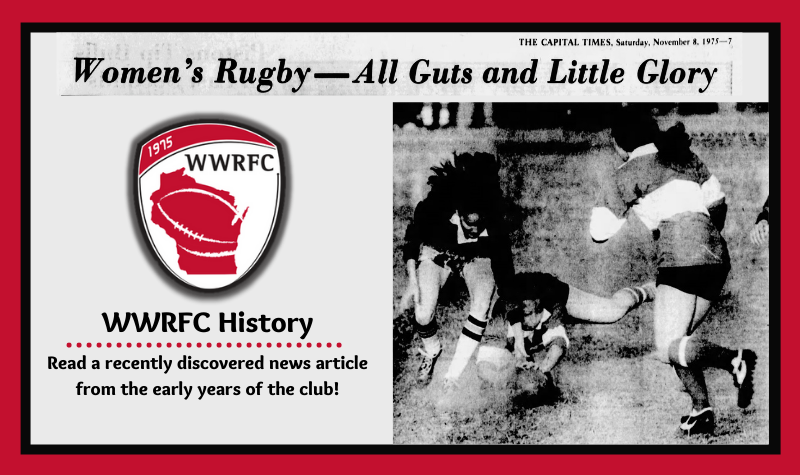Enjoy this piece of WWRFC history!
The following article appeared in The Capital Times, Saturday November 8, 1975. Click here to view a scan of the original printed article. We’ve transcribed it below for ease of reading, including photos from the article!
Do you have stories, photos, or other memories of WWRFC history you’d like to share with us? Send us a message at: ww_rfc@yahoo.com.
“Women’s Rugby — All Guts and Little Glory” by Kathy Opalewski
“If I were the marrying kind, which, thank the Lord, I am not, sir, the kind of guy that I would wed would be a rugby hooker……..” — The only proper part to a very improper rugby song.
It was dusk. The field took on an eery appearance.
Over in the far corner of the 70-by-100-yard strip, there appeared to be a game of ancient football in progress.
Unhelmeted and unpadded players, surrounded by a dust cloud, tossed, kicked and scrambled for an oversized football.
Suddenly, the cloud and its unprotected occupants thundered toward the sidelines as the spectators ran for cover.
Curses and screams became audible, dirty faces visible.
“Crap!” said one of the players after skinning her nose and knees in a tumble. Her blonde hair was a mess. Her nostrils were rings of dirt. The white stripe on her once red and white jersey blended with the dusk. She picked herself up, hurdled back into the action and could have cared less.
She and the other 29 players on the field were there to play a game they describe in superlatives like: fantastic, the best, terrific.
The game is rugby and the women are members of the Wisconsin Women’s Rugby Football Club – an infant organization just two seasons old.
Jeanne Marie Helmrick, a 5-6, 135-pound fireball called Sam, is the founder and captain of the club.
“I had been following the men’s rugby club for about two years,” the 22-year-old nursing student said. “Suddenly I couldn’t stand sitting on the sidelines anymore while they had all the fun. I wanted to play rugby.”
And play rugby, she did.
Sam posted signs around the campus last fall, announcing her desire to start a club. Seven women showed up for the first team meeting in November. None had ever played the game. Only four had ever seen it played. And the other four, well…
Sam addressed the unlikely group with a positive note.
“Look gals,” she said. “None of us knows how to play – but at least we are all in this together.”
The club, made up of nurses, students, secretaries and mothers, started a conditioning program, and received coaching from the men’s club.
They ran, jumped, rolled, laughed, cried, hurt. They learned to pass, to tackle, to be tackled. Or, at least they thought they had…
Their first game was in April. “We had practiced indoors till then cause of the snow,” Sam said. “We had never played outside. We were so inexperienced that we had to ask the referee how to line up on the field. And we didn’t know what to do with the ball. If we were like normal people, we would have walked right off the field and forgotten the whole thing. But we hung in there.”
And hang in there, they did. And lose, they did even better.
“It was the Big Ten tournament,” Sam said, recalling that cold April Day with a shutter. “We really started off big – what a way to get experience.”
The women met three teams that day, losing each time.
“We didn’t expect to win a game,” Sam said. “We were the novice team in the Midwest. Oh, brother, were we!”
Indiana won the title that day and Sam said the team really outsized them. “God, they were horses!” she said. “And we aren’t mammoth at all. We are considered one of the smallest teams – but we are faster than hell.”
Nola Bass, Sam’s 22-year-old roommate, also plays on the team. At 5-2, 115 pounds, she doesn’t look like much of a threat.
“Maybe not,” she said. “But I can get it together out there. I don’t even think of getting hurt. Nothing serious has ever happened to us – just pulled muscles, scratches and bruises.”
A junior in mechanical engineering, Nola sparkles when she talks about the game. “The comaraderie is fantastic,” she said. “We have a great time when we get together.”
“It is a beautiful, in-tact tradition that we have adopted from England. What other sport has drinking as part of training?”
The women ended their spring season winless. As a matter of fact, they scored only four points. But they won all the parties.
“One of the great things about rugby,” Sam explained, “is that it is half athletic and half social. And we really shine on the second part.”
The hosting team traditionally holds a party after each game, wining and dining their opponents.
Another great thing about rugby is the attitude. “Unlike the blood sport of football, you don’t learn to hate your opponent in rugby,” Sam said. “You go out to play a good game and you try 150 per cent to win, but when the game is over – it’s over and the teams greet each other with kind words and handshakes.
“It is a very special sport,” she continued. “You aren’t there for school, glory or money – like football. There is no place for ball-hogs and glory-seekers in rugby. You are there cause you like the game and the people you play against. I feel sorry for anyone who hasn’t had the opportunity to play it.”
This fall, in their second season, these unlikely lions have come a long way. After an 18-4 drubbing from Illinois last weekend, they evened their season to 3-3.
“God! Illinois played dirty,” Sam related. “We have never played against a team like that – we didn’t know how to handle it. Rugby may be brutal and tough, but it is very English and very proper.”
She said it is a gentleman’s sport with a moral code that outlaws violence. “Like I said, it is very proper.”
So proper, in fact, that the players aren’t even allowed to talk to each other on the field. Only the team captains can talk – and then only to the official – and then only carefully.
“Last season one of those horses from Indiana didn’t like a call,” Sam said. “So she walked up to the official and grabbed him by the shoulder. She shouldn’t have done that. The entire team was kicked off the field.”
After Illinois’ conquest of the Wisconsin women last Saturday, the teams kissed and made up – then linked arms and headed for the pub in typically English tradition.
The men’s teams, which had played earlier, followed suit. The second half of that glorious game of rugby had begun.
“When the game is over, the teams don’t go to separate bars to drown their sorrows,” Sam said. “They do it together. I love this sport of rugby, it is what all other sports are suppose to be about, but aren’t.”
The party was held at a tavern located conveniently close to the field. It became evident early that Wisconsin would sweep the social honors again.
Beer flowed and raw, raucous – but traditional – rugby songs filled the air. And soon – tradition again in tow – clothes began to fill the air as about a dozen members of one of the men’s teams paraded proudly – but not too properly – around the bar.
And that was just the beginning…
“Ya,” Sam said. “The men were great, weren’t they?”
Today the women wind-up their fall season, traveling to Fort Wayne, Ind. “We met them earlier this year and beat them, so I feel confident we can do it again,” Sam said.
She sighed and recalled the past two seasons. “We have a lot to do yet and a long way to go – but look where we are now. We might even have a winning season.”
Dave Kinyon, a soft-spoken, red-bearded rugby enthusiast, coached the women this spring. “They have improved quite a bit,” he said, “and have picked up the necessary skills. A lot of people were watching them and wondered if they could do it – and to their surprise, they did.”
Kinyon, who started playing rugby as a kid in Rhodesia, is president of the men’s club. “I grew up on rugby,” he said, “and there isn’t anything else like it in the world. Football is a ruffian’s game played by ruffians, soccer is a gentleman’s game played by ruffians, and rugby – ah, rugby – that’s a ruffian’s game played by gentlemen.”
It is a great social sport, he said, not one in which the opposing teams don’t talk to each other. “And the women have accustomed themselves very well at the parties.”
Sam’s eyes lit up as she thought of today’s game in Indiana. “It will be a great game,” she said. “The Fort Wayne club has a very good partying atmosphere – one of them broke her leg at a pre-season party.”

Nola Bass (right), member of the Wisconsin women’s rugby club, charges in to aid downed teammate Penny McCullagh, while an opponent tries to scoop up the ball. 
Penny McCullagh gets off a lucky pass just as a hefty opponent prepares to take her to the dust. 
Wisconsin’s Karen Korpi catches an arm in her face as she tries to break loose with the ball.
Explanation of Rugby
Rugby, the forerunner of Canadian and American Football, originated at Rugby School, England, in 1823.
There are 15 players on a side – eight forwards and seven backs. The game consists of two 25-minute halves (40 minutes for men). The players wear neither helmets nor padding.
There are three major differences between rugby and football:
- Blocking is illegal and only the ball carrier may be tackled.
- No member of the ball carrier’s team may be ahead of the ball carrier. If this occurs, an off-side penalty is imposed.
- The forward pass is illegal at all times. If a player is about the be tackled, the ball is either passed sideways, backwards, or punted downfield.
Play is fluid and continuous – except when an injury or infringement occurs.
When a player is tackled and has not been able to pass, the ball must be released immediately. It is then automatically in play – and free to be played by either team.
Full article citation: Opalewski, Kathy. “Women’s Rugby – All Guts and Little Glory.” The Capital Times. November 8, 1975, 7.

